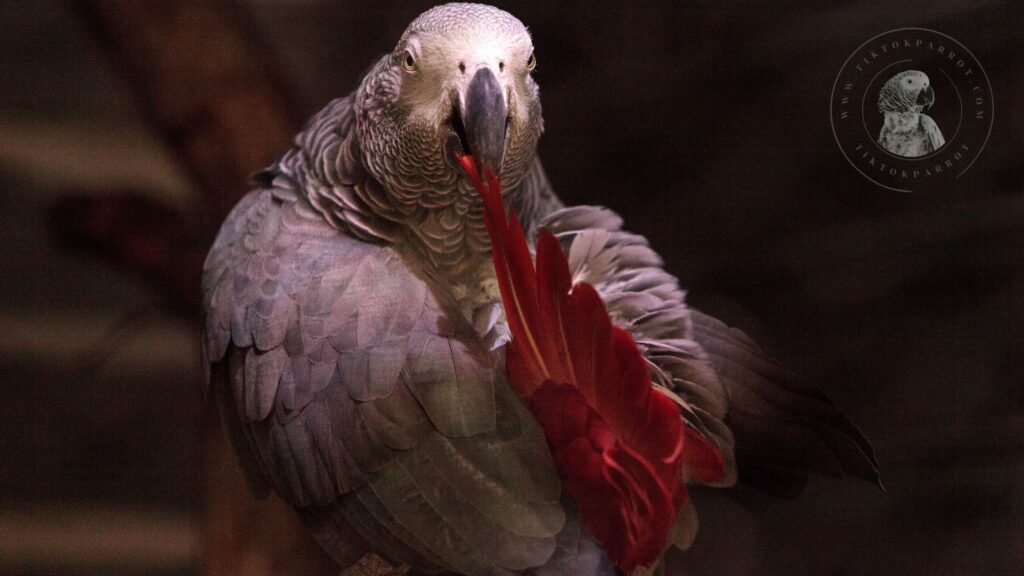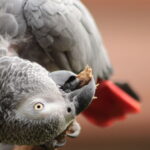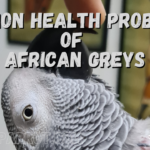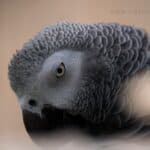It’s said that when you take a parrot into your home, you’re adopting a little ball of sunshine that can talk. African Grey Parrots, renowned for their intelligence and golden hearts, bring a unique blend of companionship, quirky behaviour, and intriguing conversation to our lives. However, being tropical birds, these feathered charmers demand specific care, especially when it comes to their skin and feathers.
African Grey Parrot glowing feathers? Our guide reveals diet, bath, sunlight & more secrets for vibrant plumage & healthy skin!
Feathers are a parrot’s pride, offering them insulation, aiding in flight, and playing an instrumental role in attracting the opposite sex. And, like human skin, their skin acts as a protective shield against environmental elements. As pet owners, understanding the basics of African Grey Parrot skin and feather care can contribute to an enriched, happier, and healthier life for our avian friends.
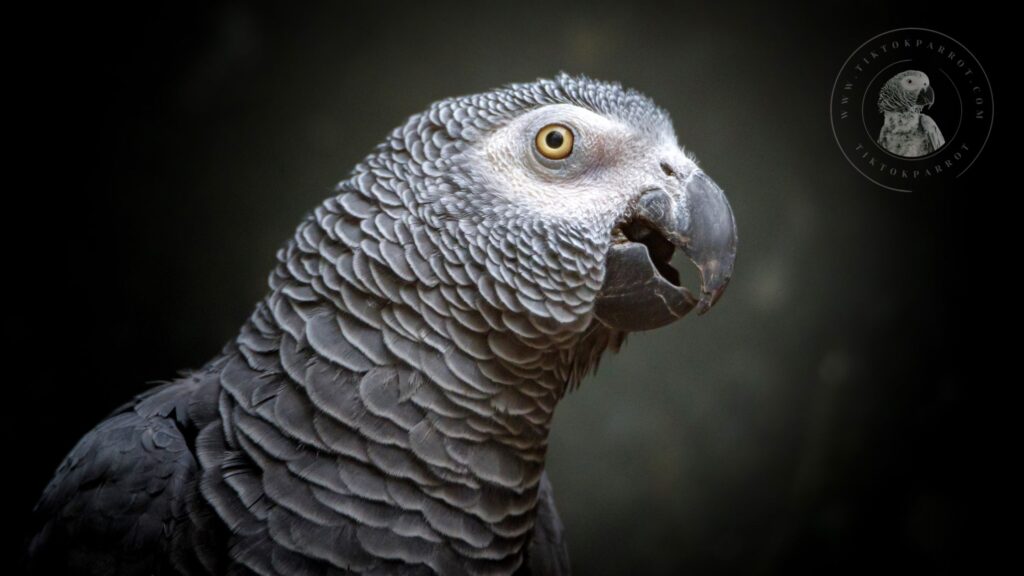
Nutrition: You Are What you Eat!
Feather and skin health in African Grey Parrots trace back to nutrition. These parrots need a diet rich in vitamins A and E, calcium, and proteins to maintain the colour and shine of their feathers. While seeds and pellets form an essential part of the diet, they should ideally be complemented with fruits, vegetables, and the occasional serving of boiled chicken or fish.
Bathing: Not Just Humans Need It!
Contrary to popular belief, parrots can’t just preen their feathers clean. They need regular baths to remove dust and maintain skin moisture. Depending on your parrot’s comfort, you can offer a bird bath, mist them with a spray bottle, or even take them into the shower! However, ensure the water is lukewarm and avoid wetting their faces, as they dislike water in their nostrils and eyes.
The best thing I would suggest is to keep a bowl of fresh water near the parrot cage or perch and let the bird do its thing. I mean, the bird would automatically start going to the water bowl and take dips, that’s what my parrot used to do (bless him).
Sunbathing: A Little Sun-Kissed Glow!
The skin and feathers of African Greys thrive with a moderate exposure to sunlight, which helps metabolize Vitamin D3, ensures calcium absorption, and naturally disinfects their feathers. Remember, though, direct exposure under intense sunlight can cause overheating. A daily dose of gentle morning sunlight is beneficial.
Humidity: A Tropical Requirement!
Native to Africa’s rainforests, the African Grey Parrot longs for a higher humidity level than typically found in most homes. You can maintain a humidity level of around 50-70% with a room humidifier or by mist spraying their enclosure. This aids in keeping their skin hydrated and promotes healthier preening and moulting.
Prevention of Parasites: The Unseen Pests!
External parasites, such as mites, can wreak havoc on your parrot’s skin and feathers. Regular checks for feather damage or skin irritation can help to catch these issues early. Consult your vet for safe parasite prevention treatment.
Vet Check-ups: Precaution is Better than Cure!
Regular vet visits are crucial to maintain your African Grey’s health. A qualified avian vet can help you monitor your parrot’s skin and feathers, weight, diet and guide you with any disease prevention measures.
Mental Health: Happy Parrot, Healthy Feathers!
Finally, remember that African Grey Parrots are sensitive creatures. Stress, boredom, and anxiety can lead to self-destructive behaviours, including feather plucking. Offer them stimuli like toys, playtime, and social interaction, and they’ll shower you with affection and pristine feathers.
Discover the joy of nurturing your African Grey Parrot’s skin and feathers! By creating a loving environment, you’ll not only keep your bird healthy and happy but also strengthen your special bond. With regular care, your parrot’s plumage will shine like never before, and you’ll be the proud owner of a stunning, thriving companion. So, get ready to preen your way to a deeper connection and a bird that’s the envy of all!
frequently asked questions about African Grey Parrot’s Skin & Feathers!
Q: Why is skin and feather care important for African Greys?
A: Healthy skin and feathers are crucial for your parrot’s overall well-being. It helps prevent skin irritations, feather plucking, and keeps your bird looking its best!
Q: How often should I bathe my African Grey?
A: Aim for a bath every 1-2 weeks, depending on your bird’s environment and activity level. Over-bathing can strip natural oils, while under-bathing can lead to skin issues.
Q: What’s the best way to bathe my African Grey?
A: Use a shallow dish, lukewarm water, and a gentle, fragrance-free soap. Gently massage the soap into the skin, then rinse thoroughly to prevent soap residue buildup.
Q: Can I use human shampoo on my African Grey?
A: No! Human shampoo can be too harsh and strip your parrot’s skin of its natural oils. Stick to a gentle, specifically designed bird shampoo.
Q: How do I prevent feather plucking in my African Grey?
A: Provide a stimulating environment, rotate toys regularly, and ensure adequate social interaction. Boredom and stress can lead to feather plucking.
Q: What’s the best way to trim my African Grey’s nails?
A: Use a bird-specific nail clipper or grinder, and trim just the tip of the nail to avoid cutting the quick (the sensitive part of the nail).
Q: Can I use a hair dryer to dry my African Grey after a bath?
A: No! Heat can cause skin irritation and dry out your parrot’s skin. Gently pat dry with a towel instead.
Q: How often should I clean my African Grey’s cage?
A: Clean the cage and accessories daily, and disinfect all surfaces weekly to prevent bacterial and fungal growth.
Q: What’s the best diet for healthy skin and feathers in African Greys?
A: Provide a balanced, nutrient-rich diet that includes a variety of fruits, vegetables, and a high-quality pelleted diet.
Q: Can I use a humidifier for my African Grey?
A: Yes! A humidifier can help maintain the optimal humidity level (50-60%) for your parrot’s skin and feathers.
Q: How do I prevent mites and lice in my African Grey?
A: Use a bird-safe mite and lice treatment, and keep your parrot’s environment clean and dust-free.
Q: Can I use coconut oil on my African Grey’s skin?
A: Yes! Coconut oil can help soothe and moisturize your parrot’s skin, but use it sparingly to avoid clogging pores.
Q: How often should I provide fresh water for my African Grey?
A: Change your parrot’s water daily to prevent bacterial growth and ensure access to clean drinking water.
Q: Can I use a UVB light for my African Grey?
A: Yes! UVB lights can help promote calcium metabolism, prevent feather plucking, and improve overall health.
Q: How do I monitor my African Grey’s health?
A: Keep an eye on your parrot’s appetite, droppings, and behavior. Consult a veterinarian experienced in avian care if you notice any changes or concerns.
If you found this blog helpful, It would be great if you could share it with your family and friends who might find it useful as well.
You might like to read these as well 🙂
How to take care of a baby African grey parrot?
Why African Grey Parrots Pluck Feathers
The Secret Grooming Habits of an African Grey’s Head Feathers
Feathered Artists: The Aesthetics and Evolution of African Grey Parrot Plumage
Shaking Your Tailfeathers: An African Grey Self Harming
For more useful content about African grey parrots, you can subscribe my site with your email to get notification upon publishing a new blog, the subscribe box you can see on the right side of this page. Also if you get an alert on your web browser while browsing my site, allow it and that will also give you an alert whenever I publish a new blog. 🙂
Stay safe and much love!


Hey there! 🐾 Looking for top-notch pet supplies or anything on Amazon?
Support our site by shopping on Amazon through our this referral link, it will not cost you extra!
Your purchases on Amazon can help us continue providing valuable content.
Thank you for your support! 🛍️

